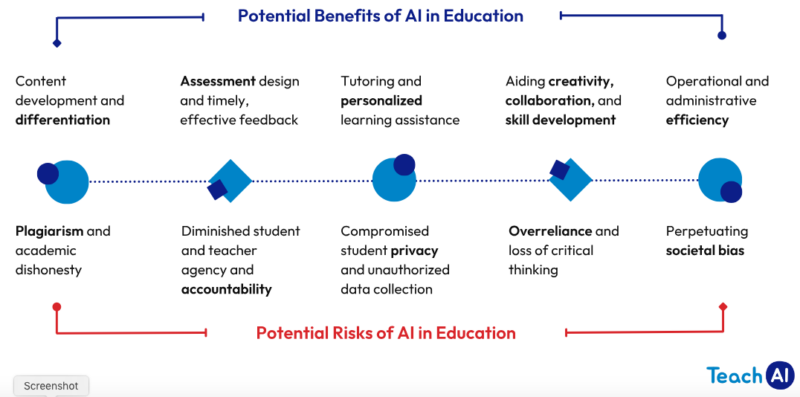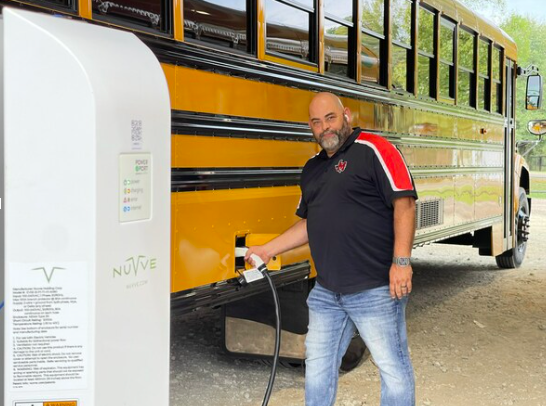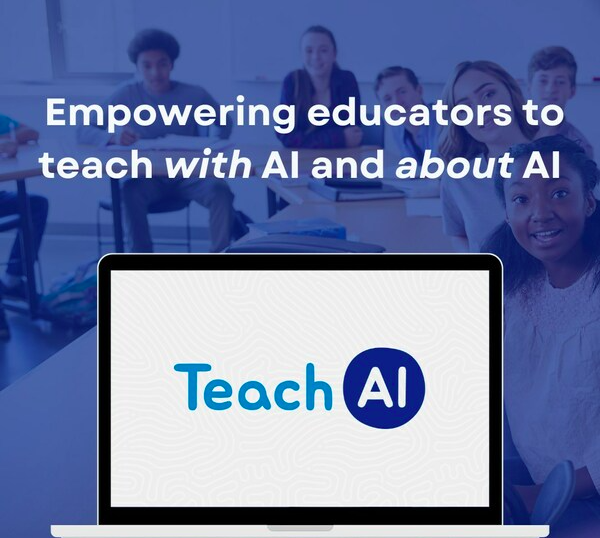This month, TeachAI, an initiative led by Code.org, ETS, the International Society of Technology in Education, Khan Academy, and the World Economic Forum, launched an AI Guidance for Schools toolkit to help education systems globally address gaps in AI guidance and policy. This resource was co-authored by Code.org, CoSN, Digital Promise, European EdTech Alliance, and PACE with input and review from policymakers, school leaders, teachers and leading tech organizations.
A recent global survey by UNESCO found that only seven percent of schools worldwide provided guidance on the proper use of AI in classrooms. The toolkit provides a framework for incorporating AI in education, real-world policy examples, sample guidance language, and resources aimed at staff, parents, and students.

“We offer the AI Guidance for Schools Toolkit in a spirit of humility and with the desire to help education leaders meet the urgent call for practical guidance on the safe, effective, and responsible use of AI,” said Pat Yongpradit, Chief Academic Officer at Code.org and lead of the TeachAI initiative. “By providing real-world examples and sample language, we hope education systems now have a place to start their discussions.”
“Harnessing the potential of AI for Los Angeles Unified schools is a journey, and the AI Guidance for Schools toolkit is a valuable resource,” said Los Angeles Unified Superintendent Alberto M. Carvalho. “It is equipping us to create an educational future that’s not just innovative, but also equitable and thoughtful.”
The AI Guidance for Schools Toolkit recommends seven principles for crafting AI guidance:
- Purpose: Use AI to help all students achieve educational goals.
- Compliance: Reaffirm adherence to existing policies.
- Knowledge: Promote AI Literacy.
- Balance: Realize the benefits of AI and address the risks.
- Integrity: Advance academic integrity.
- Agency: Maintain human decision-making when using AI.
- Evaluation: Regularly assess the impacts of AI.
“As we build tools and programs to support schools for an AI future, the AI Guidance for Schools Toolkit is a valuable resource,” said Khan Academy chief learning officer Kristen DiCerbo. “It offers principles and practical examples for schools to integrate AI in a forward-thinking way.”
“In Ceibal, we believe AI can transform many aspects of education, but this requires engagement from communities. The AI Guidance for Schools Toolkit equips students and educators for AI challenges, fostering digital self-determination,” Leandro Folgar, President of Ceibal, Government of Uruguay. “It empowers future generations to learn, collaborate, and thrive alongside AI, emphasizing AI literacy as a vital skill for the future.”
“State school leaders can’t shy away from change or the technologies that bring it about. That’s not an option for the students we serve whose future success depends on their ability to thrive in an ever-changing, technology-rich world. As we shape North Dakota’s educational strategy around AI, the AI Guidance for Schools Toolkit gives us a clear, practical guide to inform our approach,” said Kirsten Baesler, State Superintendent, North Dakota Department of Public Instruction.
As educators around the world face increasing responsibilities and time-constraints, International Schools Services (ISS), a provider of global professional development and other services for educators, has developed a provocative new 90-minute virtual course to provide relief, especially during report card season. The cutting-edge ISS EDUlearn course was prepared for educators by educators, so it is practical, responsible, and student-focused.
Participants will explore the potential of artificial intelligence in simplifying the process of crafting personalized report card comments, leading to a more efficient management of educators’ time and workload. By utilizing artificial intelligence as a personal secretary, educators can save time and effort that can be refocused elsewhere in their teaching. While efficiency is a focus, the goal is to help educators use AI technology effectively to generate tailor-made report comments that accurately reflect individual teaching perspectives.

More than 6000 educators have participated in professional development courses offered by ISS in the last two years. K12 educators can secure a virtual ticket for $75 for “Unlocking Efficiency: AI Personalized Report Card Comments Made Easy” at https://www.iss.edu/services/professional-development/unlocking-ai-overview. The live course will be held on November 29, 2023; recordings can also be purchased after the event.
Nuvve Holding Corp. (Nasdaq: NVVE), a global technology leader accelerating the electrification of transportation through its proprietary vehicle-to-grid (V2G) platform, and Blue Bird Corporation (Nasdaq: BLBD), the leader in electric and low-emission school buses, have replaced the Martinsville Independent School District (ISD)’s diesel fleet with five Blue Bird Vision electric buses, five Nuvve Level II chargers and the innovative AI-powered Nuvve FleetBox 2.0 charge management software.

Martinsville ISD Principal Keith Kimbrough with a Blue Bird Vision electric bus, and Nuvve Level II charger
Martinsville ISD is now officially the first Texas school district to boast an all-electric school bus fleet, according to the Texas Electric School Bus Project, a nonprofit that tracks school transportation electrification in the state. Blue Bird’s Vision electric, zero-emission school buses can carry a maximum of 71 students for up to 120 miles on a single charge. Based on Nuvve’s advanced battery charging infrastructure offerings, the buses require only a small portion of the day to fully recharge.
Martinsville ISD Principal Keith Kimbrough commented: “We’re a small district but proud to be leading the way on sustainable and clean commutes for Texas school children. Before I became an educator, I was in the construction industry. Now, after working so closely with Nuvve, Blue Bird and Rush Truck Centers, I’m a believer in clean transportation and clean wind power for Texas communities like mine. I’m proud to have managed the process of converting from diesel to electric from beginning to end, and we’re convinced other districts will take notice of what we’re doing here. We are happy to share the playbook and, over time, our results.”
“We’re proud of the work our Nuvve K-12 team and partners are doing to advise and fully support Martinsville Independent School District on its electrification journey, as it achieves this milestone and also marks our first installation in Texas,” said Nuvve CEO Gregory Poilasne.
Blue Bird, an iconic, century-old school bus builder, helps school districts in Texas and across North America accelerate the adoption of its electric, zero-emission school buses.
“We are pleased to team up with Nuvve and our local dealer partner Rush to help Martinsville ISD shift to clean student transportation,” said Blue Bird President Britton Smith. “With more than 1,500 electric vehicles on the road, Blue Bird is the undisputed leader in zero-emission school buses. We look forward to continuing to drive innovation and sustainability in Texas, and to inspiring other districts based on our partnership with Nuvve and the Martinsville model.”
Kimbrough secured a $1.58 million Clean School Bus grant from the U.S. Environmental Protection Agency in October 2022 to help underwrite the project. He also partnered with Rush Truck Centers as dealer, Blue Bird for the fleet and Nuvve K-12 to consult and provide the right chargers and software for the district’s routes and daily charging needs.
- How AI Has Gone To The Dogs - January 17, 2025
- From the Show Floor—AVer’s Latest EdTech Solutions - January 17, 2025
- Hot Topic—AI and Media Literacy - January 16, 2025

